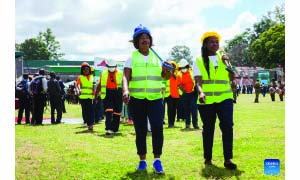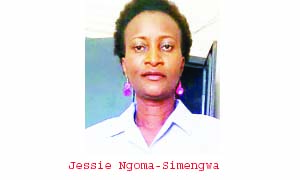EVERY woman story being shared today is a known to be a piece of our own, and that of a young girl both in rural and urban Zambia.
Being a woman can often be a source of joy and strength, but it also comes with its own unique challenges.
Once more we observe the International Women’s Day in Zambia, where women celebrate the social, economic, cultural and political achievements.
This day is also used to highlight on going gender inequality and a call for change which women are expected to thrive in an environment that treats them equal like men.
Right now, the entire life story experienced by a woman continues to grow like a shooting star from the endless list of inequality, insecurity and many others.
Women continue to experience so many side effects in their story and even though the primary cause is being addressed, there is need to escalate the pace.
As we reflect on 2023 women’s celebration, with the theme Digital Innovation and Technology for Gender Equality, here are some stories we need to speak about that will help us journey.
Sexual and gender
based violence
Right now, women and girls are completely eaten up if their struggle to see them excel will one day have a good story.
The story a woman begins with a girl child whose dream has to be fulfilled to make her life meaningful and have a beautiful place in society.
The story of a woman journeying from a girl child is a critical time that can determine the trajectory of her future as a woman later in future.
A girl child’s sad story comes with long consequences not just for themselves, but for societies and future generations.
Girls in Africa continue to encounter all forms of challenges as a result of cultural, religious and social beliefs.
It is these challenges that include early marriages, teenage pregnancies, insecurity and sexual and gender-based violence.
Every girlchild has a future that needs to be protected and all efforts should be made so that the girl child attains the education that will empower her to contribute meaningful to their communities and Further research shows that across Africa,125 million girls and women alive today, were married before their 18th birthday.
Although continuous efforts are being made to protect women and girls from different forms of violence, we still have a challenge in Zambia

Picture by Martin Mbangweta/Xinhua
This year’s women’s day celebration must awaken women and renew the momentum to see a continuous fight against Sexual and gender-based violence, inequality and other social challenges that continue to affect them.
Studies show that across Africa, 125 million girls and women alive today were married before their 18th birthday.
Furthermore, one in three women has experienced sexual violence while a good number of women have suffered permanent fractures in their marriages.
This is evident from the high cases of divorce the country continues to witness and about the time we stop hearing about unhealthy relationships with women being victims of abuse and violence, we also witness them being killed.
This brings me to the insecurity that continues to creep in us women which has seen a limitation or distraction in the development of pursuing our careers and goals.
It is this length of time in making decisions that we drown ourselves in, that has seen us experiencing abuse and violence in our relationships.
Also, women still experience challenges in sexual and reproductive health matters to ensure the well-being in relationships.
Most womenstill have challenges in negotiating for safer sex, the autonomy in household and young women in relationships has noted the inability of women to negotiate for safer sex with their partners putting them at risk of getting infected with STIs including HIV/AIDS.
Women’s political participation
The stigma against women in politics is still alive and well as many continue to face structural, socioeconomic, institutional and cultural barriers.
This is still an issue not only in Africa but, across continents. Therefore, when we talk about women’s political participation, it is easy for us to imagine the numerous seats occupied by men around the decision-making table.
A patronaged based political culture combined with gendered economic and household inequalities, have been seen to be the main barriers women face to participate into these seats of decision making.
In addition, economic resources have been one of the biggest obstacles to women’s participation in the political arena, yet their participation has been noted for achieving gender equality and genuine democracy.
Even as more women have continued to put themselves forward for elections, their numbers are still far behind those of men.
For instance, in Zambia, despite women constituting a higher population and voting we have still missed an opportunity to narrow the gender gap by achieving the 50-50 women representation.
The adoption and selection of women into decision making position is still disappointing as only 25 female parliamentarians were ushered in representing a 15 per cent compared to men with 85 per cent.
Workplace challenges
Not once or twice, have we heard and read how womenface discrimination or harassment in some organisations, which have seen challenges balancing work life and demand at home.
The cultural and societal factors too have made the day-to-day life of a woman more stressful and for working mothers or women in business balancing the scale of family and work has costed them in so many ways.
The challenge is more stressful when female employees in many private sectors are not allowed one day’s absence from work each month without having to produce a valid medical certificate.
This is a woman’s day right to one day off at their work place that has come to be known as Mothers’ Day.
Similarly, the employment code that imposes a general obligation on employers to promote nursing breaks for breastfeeding mothers has come with challenges by some investors in Zambia.
In countless ways, the achievements of women’s goals in society can only be achieved if the identified obstacles being experienced implemented effectively.
For now, women continue to be vulnerable in so many areas of their lives.
For comments: jessiengm@gmail.com







